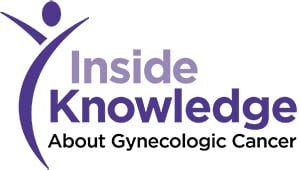Inside Knowledge About Gynecologic Cancer Campaign

The Inside Knowledge campaign raises awareness of the five main types of gynecologic cancer: cervical, ovarian, uterine, vaginal, and vulvar. It encourages women to pay attention to their bodies, so they can recognize any warning signs and seek medical care.
Inside Knowledge supports the Gynecologic Cancer Education and Awareness Act of 2005, or Johanna’s Law. The law is named for Johanna Silver Gordon, who died of ovarian cancer in 2000. The campaign’s target audiences include women and health professionals.
Campaign Resources
- Public service announcements (PSAs) are available at no cost for organizations and individuals to share with local media. To request video files, please contact CDC-INFO.
- Inside Knowledge provides fact sheets and posters for the general public, health care providers, campaign partners, and health organizations. You can download these materials and print them at home or at a local print shop. To order printed copies of selected publications, please visit CDC-INFO on Demand.
- The Inside Knowledge campaign has a suite of videos to share on web or social platforms, including short-form cancer-specific content and survivor animated story series, and our most recent 6-part web series Under the Paper Gown featuring late night comedy host, Amber Ruffin.
See the Resources to Share.
Audiences
- Women of all ages, races, and ethnic groups, especially those aged 35 years and older.
- Health care providers.
Messages
- Pay attention to your body and know what is normal for you. Gynecologic cancers have warning signs.
- When gynecologic cancers are found early, treatment is most effective.
- If you have vaginal bleeding that is unusual for you because of when it occurs or how heavy it is, see a doctor right away.
- If you notice any other unexplained signs or symptoms that last for two weeks or longer, see a doctor.
- Getting screened regularly can help prevent cervical cancer or help find it early, when it is easiest to treat.
- Human papillomavirus (HPV) is the leading cause of cervical, vaginal, and vulvar cancers. Consider getting the HPV vaccine if you are in the age group for which it is recommended.
- A family history of ovarian cancer can increase your risk. While most women who are diagnosed with ovarian cancer don’t have a family history of the disease, having close family members (such as your mother, sister, aunt, or grandmother) on either your mother’s or your father’s side who have had ovarian cancer can increase your risk.
- There are factors that may increase your risk for uterine cancer, including if you are over the age of 50, have obesity, take estrogen, or have a family history of uterine, ovarian, or colon cancers.
Campaign Development
Inside Knowledge messages and materials are based on—
- Consultation with gynecologic cancer experts and survivors.
- Formative research and focus group testing with women across the U.S. to understand their knowledge, attitudes, and beliefs related to gynecologic cancers, and to identify creative approaches and strategies to deliver the campaign’s messages effectively.
- Formative research with gynecologists, primary care physicians, and nurse practitioners to understand their knowledge, attitudes, and clinical practices related to gynecologic health and gynecologic cancer, and to assess the usefulness of campaign educational materials.
- Analysis of data from national surveys in which CDC commissions questions about women’s and health care providers’ knowledge, attitudes, and practices related to gynecologic cancer.